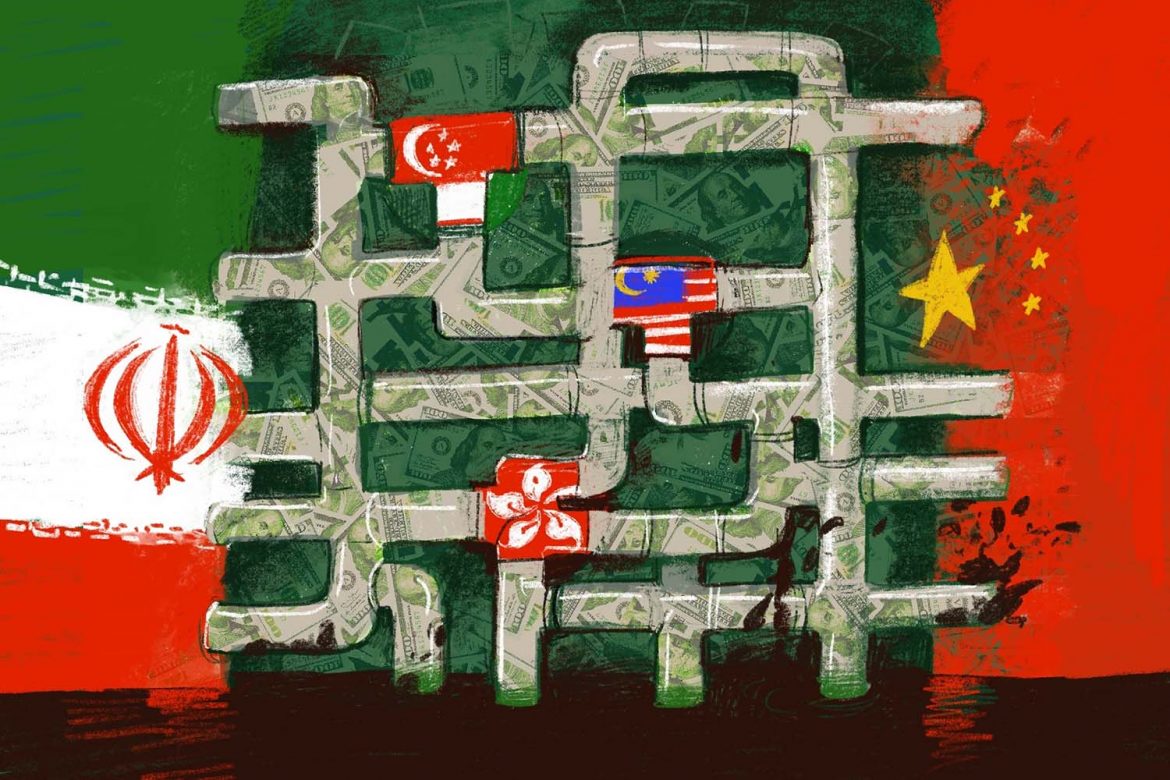The Organized Crime and Corruption Reporting Project investigated the laundering of China’s oil money for Iran.
Swedish-Iranian businessman Hatam Khatun Nema ran an obscure Hong Kong company, HMEA CO., LIMITED, that laundered hundreds of millions of dollars through a web of shell companies and businesses stretching from Singapore to Panama, according to an OCCRP report.
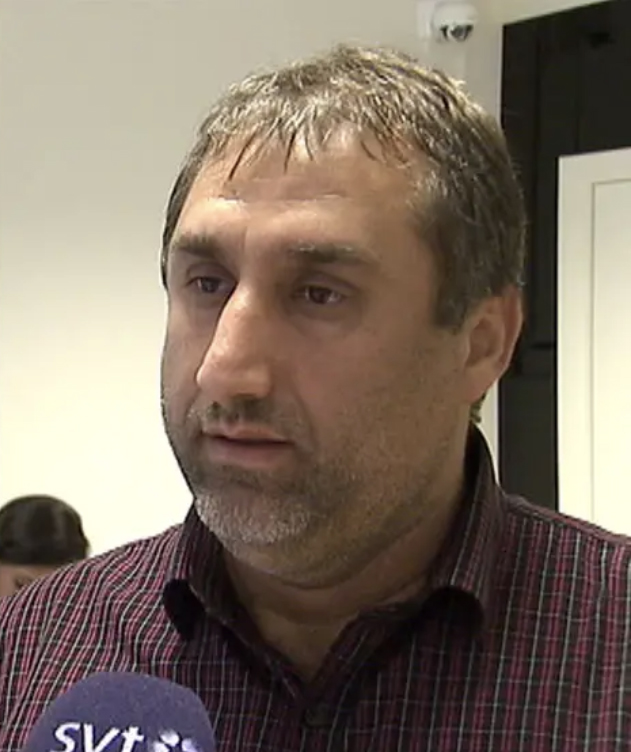
A major customer of Nema’s operation was the Islamic Republic of Iran. Between 2012 and 2014, he helped move payments for the oil that Iran sold to China, its most important trading partner and geopolitical ally.
The network allowed Chinese energy companies to hide the oil payments, which could bring U.S. scrutiny and possible sanctions for violating restrictions on dollar-based trading with Iran.
Reza Zarrab, who gained his fame after his arrest in Miami in 2016, also played a role in laundering money in transferring it to Iran. He pleaded guilty to bank fraud and money laundering.
While Zarrab interacted with the Turkish elite, including President Recep Tayyip Erdogan, and led a wealthy lifestyle, no one noticed the likes of Nema, whose low-key operation from a gray bungalow on the outskirts of Stockholm did much the same work for the same client.
Covert Networks
OCCRP and its media partners examined financial records, including bank transactions from the U.S. investigation of Zarrab, of Turkey’s state-owned Halkbank, and of the bank’s former director, Mehmet Hakan Atilla, who helped Zarrab move billions of dollars for Iran.
The records reveal multiple covert financial networks, including Hong Kong-based groups centered on Nema’s HMEA.
Nema incorporated the company in March 2012, less than a month after President Barack Obama signed an executive order prohibiting U.S.-linked banks from handling most transactions involving Iran.
Claiming only HK$10,000 (less than US$1,300) in registered capital, and with no stated business purpose, HMEA moved at least $450 million between 2012 and 2014, the period covered by transaction records obtained by OCCRP.
The money, which flowed through accounts at seven international banks, included at least $100 million in transactions with oil industry-related companies, and at least $130 million in transfers through obscure entities linked to criminal networks and sanction-busting schemes.
Created by company services provider Richful Deyong International Business (China) Limited, HMEA had a prestigious address in Lippo Centre, an iconic skyscraper in Hong Kong’s central business district.
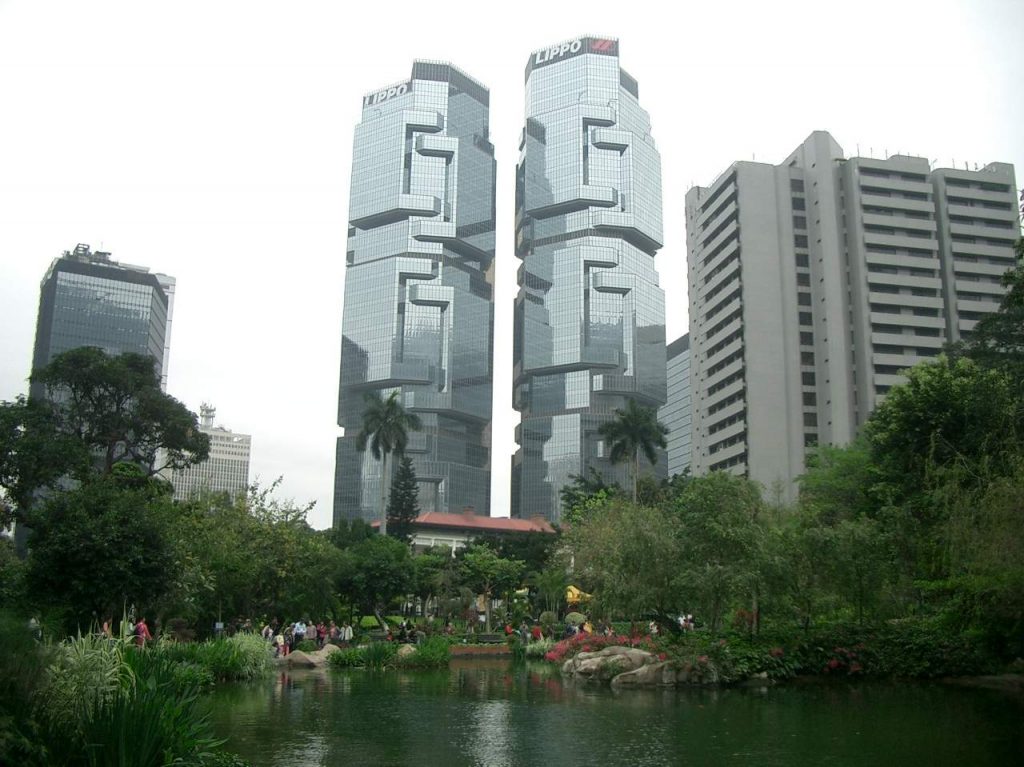
Sanctions Evasion
China and Iran are now finalizing a multi-billion economic and security deal, which could reportedly see massive Chinese infrastructure investment in exchange for discounted Iranian oil.
China takes advantage of Iran’s economic isolation. With little competition, the world’s largest petroleum importer is able to buy Iranian oil at favorable prices and has filled the financial vacuum left by sanctions.
Operations like HMEA’s allow the system to work. In July 2013 alone, HMEA transferred at least $100 million between major Iranian and Chinese oil interests. This includes at least $60 million that HMEA received in a single day from China Best International (HK) Limited, a four-month-old Hong Kong company then controlled by Chinese national Liu Qianting.
The businessman is the current CEO of Zhoushan Jinrun Petroleum Transfer Co Ltd, a company that operates bonded oil storage terminals in China’s Zhejiang province, where cargos are not required to clear customs. Last year, Reuters reported that Zhoushan Jinrun was offloading Iranian crude oil that had been transferred between cargo ships before entering Chinese waters to disguise its origin.
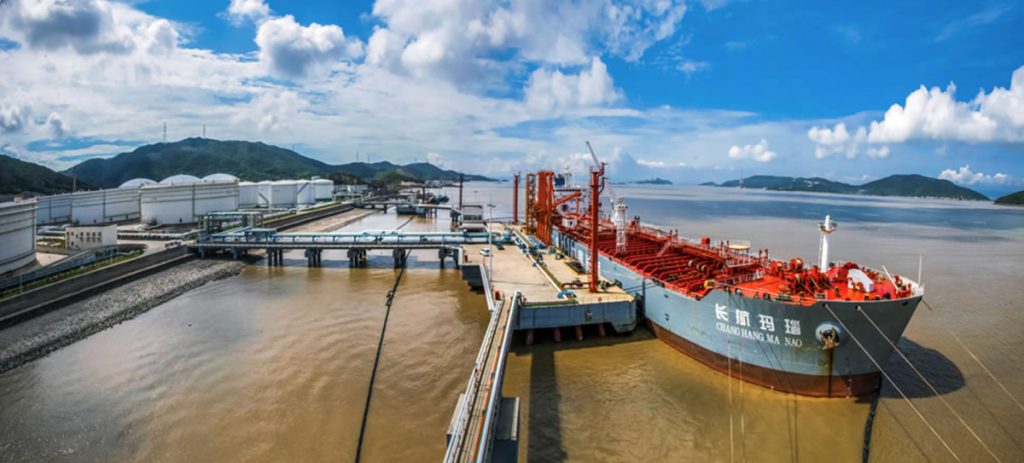
Zhoushan Jinrun is a subsidiary of Herun Group, a private conglomerate controlled by Yu Songbo, who in 2014 made the Forbes “China Rich List” with an estimated net worth of $1.3 billion.
Liu Qianting, Zhoushan Jinrun’s CEO, is also a shareholder in several energy and logistics firms affiliated with Herun Group. Moreover, China Best International, the company that sent HMEA the $60 million, shares an address with a Herun Group Hong Kong subsidiary. China Best was subsequently transferred to a new owner with no known connection to oil. Herun Group did not respond to a request for comment.
At the other end of the oil money pipeline, HMEA made cumulative payments of at least $46 million in July 2013 to International Oil and Design Construction Labuan Ltd., a company registered on Labuan, a Malaysian island known for tight corporate secrecy where Iranian oil shipments destined for Asian markets are disguised.
That company’s ultimate owner, through a company registered in Kuala Lumpur, is Oil Design and Construction Corp, an Iranian state-owned oil and gas company. Two principal directors of an ODCC subsidiary, Maziar Modarres Sadeghi and Majid Malek, also established a Hong Kong subsidiary in March 2012, just four days after HMEA’s incorporation. Both have strong ties to Iranian state energy and shipping interests.
The Swedish Rainmaker
Despite HMEA’s immersion in global intrigue, its Swedish-based controlling shareholder, Hatam Khatoun Nema, the Baghdad-born, lived in a small bungalow in Järfälla, a North Stockholm suburb best known for its large immigrant population and an outlet shopping mall. He also owns an apartment in central Dubai and has Iraqi citizenship.
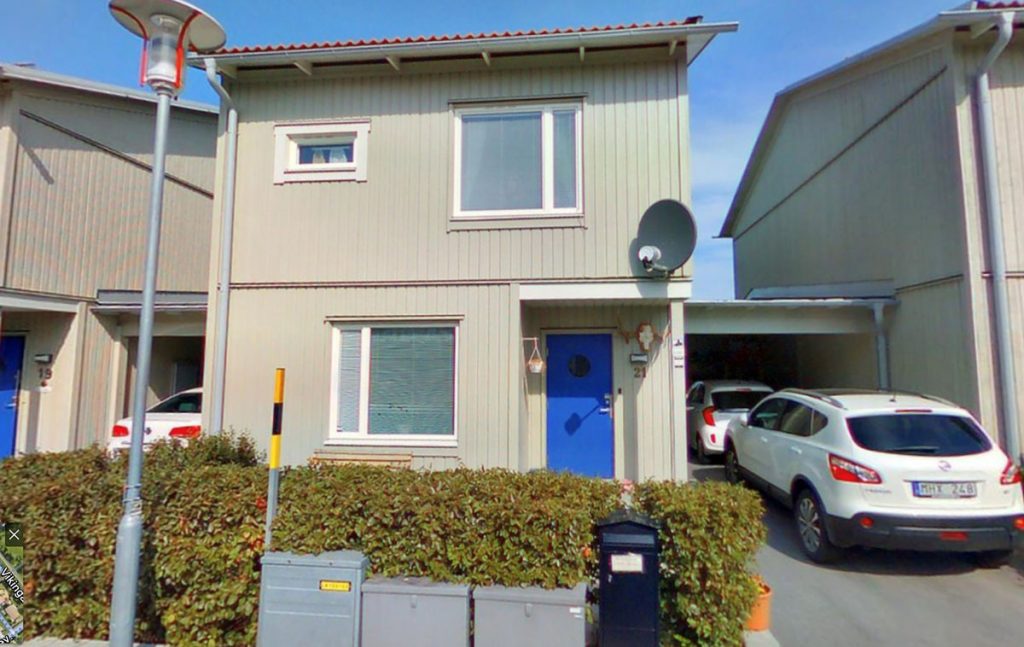
Nema has run more than a dozen small businesses in Sweden, Iran, Hong Kong, the United Arab Emirates (UAE), Lithuania, and Estonia over the past 20 years, often working with siblings who live in Stockholm.
His first Swedish company, H.M Import and Export Handelsbolag, was incorporated in 2000. It provided money exchange services for a wide range of clients, including the Iranian embassy in Stockholm. In 2006, he co-founded H.M. International Travel AB, a major ticketing agent in Sweden for state-owned Iran Air.
Swedish tax authorities began to suspect bookkeeping irregularities at H.M. Import and Export in 2005, but Nema’s operations escaped serious scrutiny until late 2012, when he was ensnared in a criminal investigation of a business partner, a man named German Frank Kaur.
Kaur’s Estonian construction firm, Tenrent OU, which also had operations in Sweden but was not officially registered there, was suspected of creating a tax evasion scheme for Swedish construction companies. As part of the scheme, HMEA and other Nema companies generated false invoices that were used to launder proceeds through Hong Kong banks.
Swedish authorities who searched Nema’s home in November 2013 found bank statements suggesting HMEA links to Iran — a lead they never pursued. Nema was convicted of serious accounting fraud, however, and went to prison for about 10 months.
While Swedish investigators focused solely on tax evasion, authorities in Lithuania cast a wider net. In May 2013, before the raid in Sweden, Nema had established a company called UAB Hameja in Vilnius. A few months later, Lithuanian investigators were alerted to suspicious bank transactions involving fake shipments of Iranian pistachio nuts.
In December 2015, Nema was charged with money laundering, false accounting, conducting illegal business activities, and using forged documents. Following his release from prison in Sweden, he was extradited to Lithuania in May 2018. He pleaded not guilty, posted bail, and never went back for further questioning.
HMEA was dissolved by September 2017, but Hong Kong company records show that in May 2018 Nema assumed directorship of another Lippo Centre-based company, Electra Trade Co Ltd, which was incorporated in 2017 by a UAE national of likely Iranian origin.
Nema never returned to Lithuania to face prosecution, and an EU arrest warrant was issued in 2019. His whereabouts are unknown. Attempts to reach him for comment through his family were unsuccessful.
In addition to his own business links to Tehran, Nema has acknowledged a close partnership with a businessman with multiple operations in Iran. In a statement to a Swedish court, Nema identified HMEA’s “real owner” as his friend and business partner, Ehsan Azarnekou, 39, an Iranian who also holds citizenship in the tiny Caribbean island nation of Dominica. His LinkedIn profile indicates a base in Iran and identifies HMEA as his principal business. Azarnekou co-founded Red Lantern, a Tehran-based trading and banking company, in 2008.
Azarnekou incorporated Red Lantern Co Ltd in Hong Kong on June 9, 2010. The company’s co-founders were Shahrzad Arabinarei, an Iranian residing in China, and Zhang Xiaopeng, a Chinese national.
Like Nema, Azarnekou is a hard man to find. Both list residential addresses in Dubai and their current locations are unknown.
HMEA conducted transactions with entities headquartered across a wide range of jurisdictions, from Switzerland to Dubai, which were subsequently fined or blacklisted by the U.S. for violating sanctions. HMEA also made payments to Chinese and Indian companies accused of economic espionage and theft of trade secrets.
HMEA received at least $130 million from a network of Hong Kong, Singapore, and British Virgin Islands-based shell and trading companies.
These obscure entities moved money predominantly through bank accounts in China, Thailand and Singapore, and involved interconnected networks of shareholders operating mainly from Yiwu City, a light manufacturing hub in eastern China.
Tehran’s Fingerprints
According to Swedish court records, Nema acknowledged that he provided money exchange services to the Iranian embassy in Stockholm, and that his major clients included Viewnet Enterprise AB, a Swedish safety and security company once hired by Iran’s Ministry of Road and Transportation in Tehran to install surveillance equipment.
The Iranian government’s exact relationship with HMEA is unclear.
The timing of the company’s formation, plus the scale of transactions, suggest that HMEA was part of a coordinated response to the increasing U.S. sanctions. Bank transaction records show that Chinese and Iranian oil companies used a number of other underground networks besides HMEA to move oil money during this period.
Last year, the U.S. blacklisted a Chinese state-owned oil trading company and its CEO for buying Iranian oil. Two tanker operators belonging to China’s largest shipping company were also sanctioned.
The Lippo Centre-based network of companies uncovered by this investigation.
But that doesn’t mean these networks are gone.
“On the one hand, banks are implementing more stringent know-your-customer and compliance programs,’’ she said. “On the other, sanctions evasion schemes have become even more sophisticated, aided by the growth of virtual currencies, which are increasingly being embraced by large banks”, said Jessie Liu, a former U.S. Attorney involved in the 2019 prosecution of Standard Chartered bank for Iran sanction violations.
The Financial Action Task Force, an international anti-money laundering watchdog, accused Iran of failing to counter “terrorist financing risks” and reimposed countermeasures that effectively blacklist the country earlier this year.
This material belongs to: OCCRP
 info@anticorr.media
info@anticorr.media
